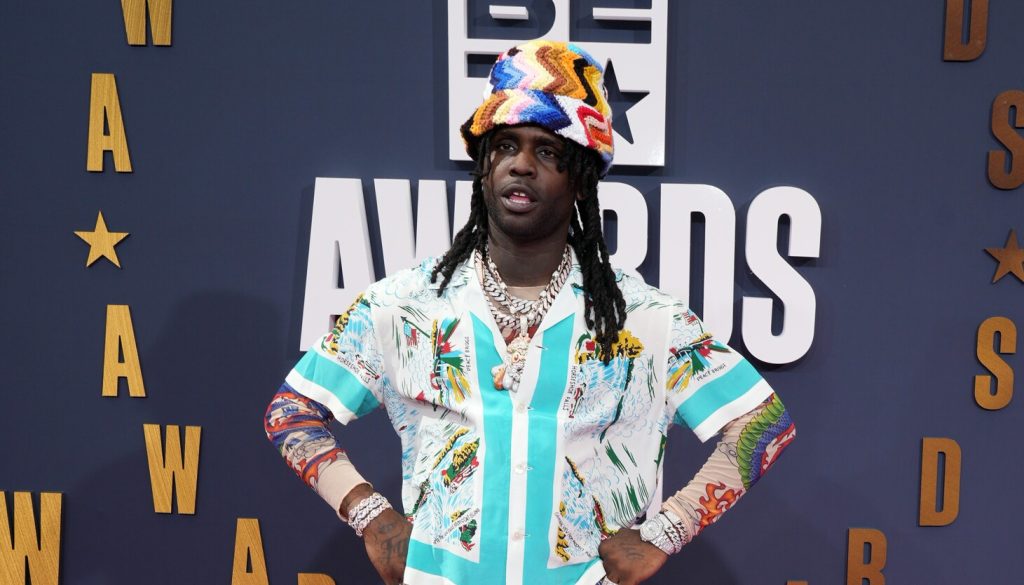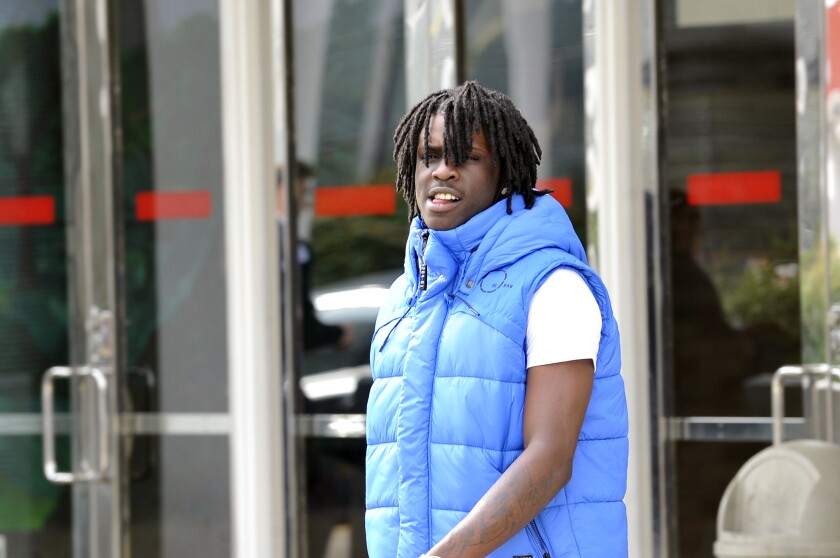The anticipation surrounding Chief Keef’s return to the Chicago area is at a fever pitch.
Locals and industry insiders are already using phrases like “historic” and “iconic” to describe the rapper’s upcoming performance this weekend at the Lyrical Lemonade Summer Smash festival. The Leaders 1354 retail store in West Loop has even launched a “Chief Keef Pop-Up Store,” and staff say they are fielding a flood of Instagram messages about the merch and the show.
When the 28-year-old Englewood native takes the stage Sunday at Bridgeview’s SeatGeek Stadium, it will be his first local show in over 10 years.
Expect the moment to feel like the Bulls winning an NBA championship, said Idris Dykes, aka “Peeda Pan,” Chief Keef’s longtime manager.
“This is something I can attach to those huge moments in Chicago culture,” he said. “It’s one of the most exciting times of my life, considering it’s something that we thought for a long time would not be possible.”
At just 16, Chief Keef — born Keith Cozart — became the face of drill, a style of hip-hop characterized by violent lyrics. With hits such as “I Don’t Like,” “Love Sosa” and “Faneto,” he achieved superstardom and global recognition for the subgenre. He also became a fashion icon, partnering with True Religion and the late Chicago designer Virgil Abloh.
But Keef also gained attention for getting in trouble with the law and clashing with government officials who prevented him from performing in Chicago. A Los Angeles resident since 2014, the rapper has “made amends’’ with Chicago officials, according to Dykes. Keef also has resolved his legal matters, including an outstanding warrant associated with a 2014 DUI case in Lake County. Court records show that Keef negotiated a plea of guilty last month.
Keef also had an outstanding warrant for unpaid child support in Cook County in 2014. The Sun-Times previously reported that he owed $14,613, and court records show the case was resolved and closed last month. Dykes said Keef had challenged the original amount, which they considered “excessive and unfair.”
With those troubles behind him, Keef’s homecoming marks a new era for the rapper, whom fans and friends today praise as mature and focused.
“I just appreciate seeing the growth,” said Amaris Hewitt, aka “DJ Aramis,” who has worked with him for more than a decade. “He got a chance to get his mind together. He got his career together. And now he’s ready to come back.”

In celebration of Chief Keef’s performance at the Lyrical Lemonade Summer Smash Festival on Sunday, Leaders 1354 retail store, at 1152 W. Madison St., will host a Chief Keef Pop-up store Thursday through Sunday during select hours. Visit instagram.com/ldrs1354 for more details.
As a teenager, Keef generated local buzz with mixtapes such as “Bang” and “Back From the Dead.” Word quickly spread after he shot music videos from his neighborhood and uploaded them to YouTube.
Keef made music that reflected his environment and experiences, and he wasn’t the only one. The late rapper Pac Man is considered the originator of drill, and King Louie is recognized as an early innovator. But Keef popularized the genre, which spawned other Chicago stars, including Katie Got Bandz, G Herbo and Lil Durk.
“I look at drill rappers as the original influencers,” said Jabari Evans, of the hip-hop duo Kidz in the Hall, who grew up in Chicago and now teaches race and media at the University of South Carolina.
“They understood virality in a way that I believe goes unremarked in terms of their genius and their ability to use social media to garner large audiences.”
By the summer of 2012, Keef’s breakout hit, “I Don’t Like,” was remixed by Kanye West. He received a reported $6 million record deal from Interscope Records and performed at Lollapalooza. He released his first album, “Finally Rich,” that December.
“I always was in awe of him because he was just a kid,” said 323 Music Group owner Beleshia Mcculley, aka “Lyrical,” who managed several drill artists in the city. “These labels started giving all of these kids deals. And he was the person that got the biggest deal. … So, everybody at that particular time was just doing amazing.”
At the same time, it was difficult to divorce real-life violence in the city from the music. And, over the years, several drill artists — including Lil JoJo, Pac Man, FBG Duck, King Von — were killed.
For a time, drill shows were being banned in Chicago venues as some media outlets rushed to label the city the “murder capital” of the country and right-wing elected officials took interest in violence in the city following the release of an FBI crime statistics report in 2012 that made no such claim.
“Keef, in some ways, was a scapegoat,” Evans said. “He was the face of a movement that was seen as terrorizing our city. … I think what [former Mayor Rahm Emanuel] and several other politicians tried to do during that period of time is look like they were being proactive.”
That meant keeping drill out of downtown venues, he added.
Dykes said Keef moved to Los Angeles to start a better life for myriad reasons, including his precarious relationship with the city.
“The atmosphere never felt welcoming,” Dykes said. “It never felt like that door was open, especially during Rahm’s time being mayor.”
That was evident during July 2015, when Keef made attempts to perform a concert in Chicago as a hologram to benefit the victims of a fatal shooting in Chicago. Both his friend, rapper Marvin Carr, aka “Capo,” and a 13-month-old were killed in that incident.
Keef was thwarted by Emanuel, whose office released a statement that referred to the rapper as “an unacceptable role model” and labeled the performance “a significant public safety risk.”
Later, on July 25, Keef made a brief appearance by hologram at Craze Fest in Hammond, Ind., before the police shut down the concert.
“I just think they were trying to make an example out of him and blame him for the violence, which is insane because Chicago has always been a violent city,” said Swank PR firm owner Briahna Gatlin, who has worked with several drill artists in the city. “For a whole city that you grew up in to try and make you responsible for something that has been happening over the past 50 years, that’s kind of a heavy cross to bear.”
A decade later, Keef has been met with a more understanding response from the mayor’s office, Dykes said.
And Chicagoans are looking forward to simply enjoying the music without associating it with violence in the city, Evans said.
“[Chief Keef] is one of the most important artists of his generation, and now we have the opportunity to actually celebrate him in a way like never before,” Evans said. “It’s really great to see.”
window.fbAsyncInit = function() { FB.init({
appId : '425672421661236',
xfbml : true, version : 'v2.9' }); };
(function(d, s, id){
var js, fjs = d.getElementsByTagName(s)[0];
if (d.getElementById(id)) {return;}
js = d.createElement(s); js.id = id;
js.src = "https://connect.facebook.net/en_US/sdk.js";
fjs.parentNode.insertBefore(js, fjs);
}(document, 'script', 'facebook-jssdk'));
Source link

